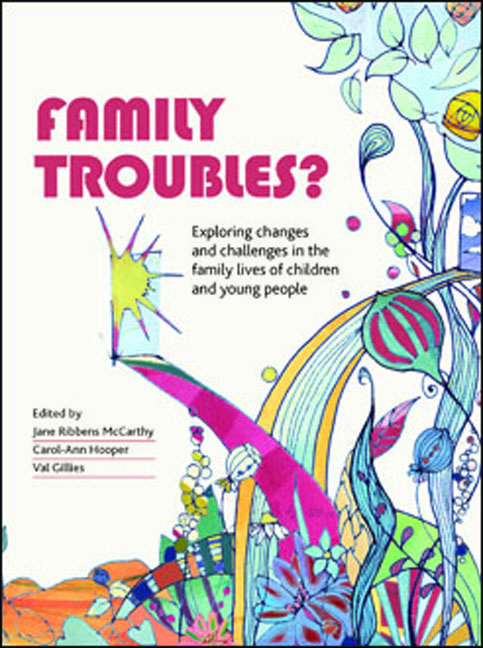Book contents
- Frontmatter
- Contents
- Notes on contributors
- Foreword
- Preface
- 1 Troubling normalities and normal family troubles: diversities, experiences and tensions
- Part One Approaching family troubles ? Contexts and methodologies :Introduction to Part One
- Part Two Whose trouble ? Conteste d definitions and practice: Introduction to Part Two
- Part Three The Normal, The Troubling And The Harmful?: Introduction to Part Three
- Part Four Troubles and transitions across space and culture: Introduction to Part Four
- Part Five Working With Families: Introduction to Part Five
- Index
22 - What supports resilient coping among family members? A systemic practitioner's perspective
Published online by Cambridge University Press: 07 September 2022
- Frontmatter
- Contents
- Notes on contributors
- Foreword
- Preface
- 1 Troubling normalities and normal family troubles: diversities, experiences and tensions
- Part One Approaching family troubles ? Contexts and methodologies :Introduction to Part One
- Part Two Whose trouble ? Conteste d definitions and practice: Introduction to Part Two
- Part Three The Normal, The Troubling And The Harmful?: Introduction to Part Three
- Part Four Troubles and transitions across space and culture: Introduction to Part Four
- Part Five Working With Families: Introduction to Part Five
- Index
Summary
Introduction: learning from practice, linking to theory
What helps family members develop shared, supportive and constructive ways of responding to life events, both expected and unexpected? This chapter will explore how their relational and social context supports the development of resilient coping in a family/kin group. Individual definitions of resilience speak of the ability to bounce back in the face of adversity and overcome life challenges (Rutter, 1999). Joseph and Linley (2008) write of the potential we as individuals hold for post-traumatic growth. Resilience is not about invulnerability or untested capacity to cope. Interestingly, much of the research on the development of individual resilience posits the importance of others, as sources of support and esteem, or the importance of other activities and contexts that support competence, again often involving others (Rutter, 1999). In my therapeutic practice, I am keen to identify and strengthen key interactional processes that support resourcefulness in the couple or family group, in the face of trials, tribulations and too much uncertainty (Smith, 1999). Thus, for me, resilience becomes a concept of ‘within and between’ – the formulation of a set of hypotheses both about what supports resilient coping in individuals and what leads to a shared set of beliefs about, and practices of, resilient coping in the family group. Families will be defined here either as the resident household group, which may span a number of generations, with legal, birth and/or psychological ties, and/or as the ‘problem-determined system’, that is, that group of people with intimate emotional connections organised around particular psychological dilemmas and problems in living. This sometimes includes non-resident members, such as life partners and ex-spouses, and the boundaries may change over time.
To put my thinking about family resilience into context, I am a clinical psychologist and a systemic family psychotherapist and for the past 16 years, I have co-directed a domestic violence project where we work therapeutically with both victims and perpetrators of violence, in all its forms, within any family relationship, for example, siblings, parents and children (of any age), couples, older people and their carers, and so on (Cooper and Vetere, 2005).
- Type
- Chapter
- Information
- Family Troubles?Exploring Changes and Challenges in the Family Lives of Children and Young People, pp. 279 - 290Publisher: Bristol University PressPrint publication year: 2013

